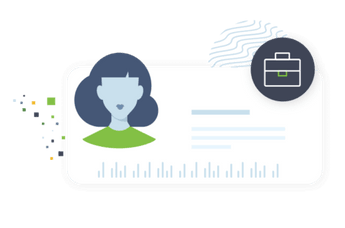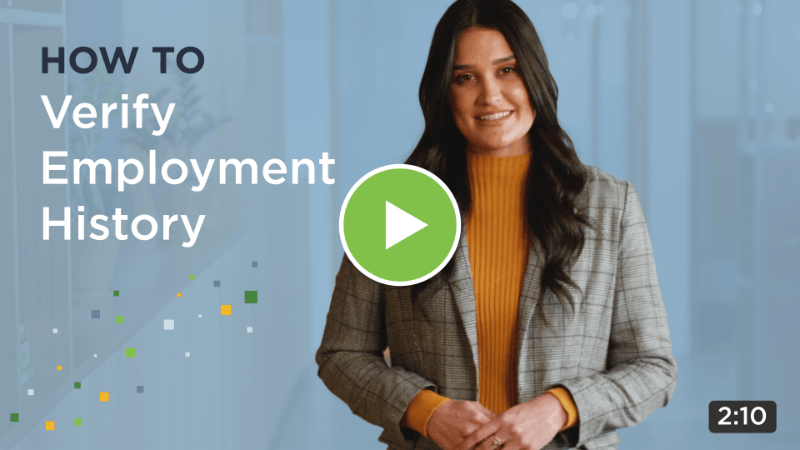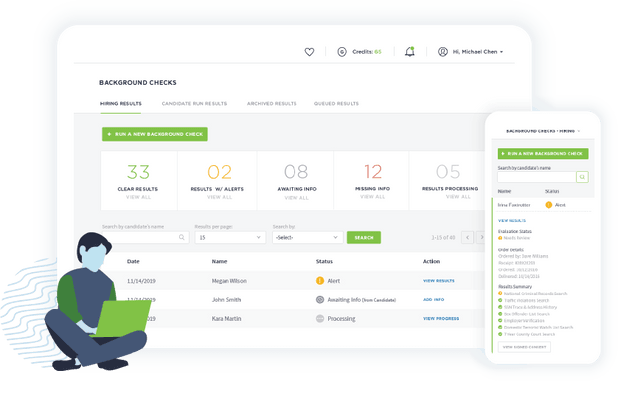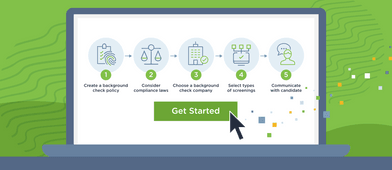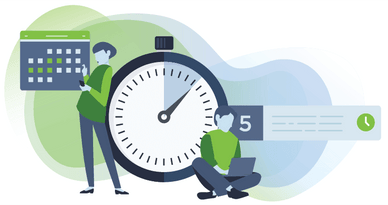Employment Verification
Employment Verification & History Checks
Make informed decisions by verifying your candidate’s employment history and job-related experiences.
Trust & Safety
The Importance Of Employment History Verification
Employers verify employment history to confirm the information provided by a candidate is true; the work experience is sufficient to meet the position’s requirements; and past titles, achievements, or responsibilities are valid.
- Hire qualified candidates more quickly
- Ensure your candidate’s employment history is accurate
- Confirm your candidate has the skills and experience required
- Mitigate risk of hiring a candidate with false credentials
Results
What You’ll Learn From Employment Verification
Using Employment Verifications as part of a comprehensive pre-employment screening process helps you make informed decisions and instills confidence that you’re hiring the most trustworthy, qualified candidates for the positions you need to fill. For the most reliable results, Employment Verification checks will contact current or previous employers directly to confirm the accuracy of your candidate’s employment details, including dates of employment (start and end dates) and job title(s).
Search Options
Types Of Employment Verifications Offered By GoodHire
With Employment Verifications, GoodHire’s team of experts helps reduce your workload by validating your candidate’s employment history. Each Employment Verification check confirms employment details by contacting the employer specified up to five times over five business days. Although the employer’s phone number is requested from the candidate, it’s used only if one cannot be independently identified.
US Employment Verification
SEARCHES
Each verification contacts a single employer.
BEST USED FOR
Verify employment history is accurate and experience is valid.
VERIFIES
Dates employed & job title(s).
International Employment Verification
SEARCHES
Any employer specified in one of 223 countries.
BEST USED FOR
US residents who have worked outside of the US.
VERIFIES
Dates employed & job title(s).
Employment Verification – Canada
(Contact Sales)
SEARCHES
Any employer worldwide.
BEST USED FOR
Canadian residents.
VERIFIES
Dates employed & job title(s).
Compliance
What You Need To Know When
Running Employment Verifications
Employers using a Consumer Reporting Agency (CRA), like GoodHire, to run background checks to assess candidates during the hiring process have important responsibilities to ensure a fair and respectful process for the candidate, and to comply with various laws and regulations that govern employment screening.
Disclosure & Authorization
The FCRA requires employers to inform the candidate that they intend to run a background check, and obtain the candidate’s permission to do so.
Adverse Action
If the results of a background check prompts a decision to deny employment, the FCRA requires employers to follow specific adverse action steps.
What Is Employment Verification? What You Need To Know
Employment verification can be a challenging and time-consuming part of the hiring process for human resources teams–especially during busy hiring times or when interviewing candidates with an extensive work history. Read on to learn how employment verification works, including ways to confirm a candidate’s employment history and eligibility to work in the US, information that can be released, and how to conduct verifications that are compliant at the federal, state, and local levels.
What is employment verification?
Employment verification can help employers confirm information provided on a candidate’s or volunteer’s resume related to their job history, which may include past employers, job titles, and employment dates. Confirming employment history can help provide insight into a candidate’s skills and experience in relation to the role for which you’re hiring and mitigate the risk of false credentials.
Employment verification is often conducted as part of a comprehensive background check that may also include a criminal record search, education verification, driving record check, and more.
97% of customers say our turnaround time is faster.
Get StartedEmployment verification vs. reference checks
An employment verification isn’t the same as a reference check. Employment verifications confirm a candidate’s previous work history, including past employers, dates of employment, and positions held. A professional reference check provides a more in-depth look at a candidate’s work experience and character through interviews with previous employers or colleagues. A reference check may include insight that an employment verification does not provide, such as information about a candidate’s soft skills, general reputation, personal and professional strengths, areas for improvement, and more.
How to verify employment history
There are a few ways companies can complete an employment history verification, including using The Work Number, partnering with a background check provider, or handling it internally.
The Work Number
Some employers can verify employment history and income information through The Work Number® database, which is a fee-based service offered by Equifax that provides information about employee work histories from employers within the US. Though The Work Number allows employers to get candidate information that’s been verified by Equifax, not all employers report into the database which can lead to incomplete data and you must also go through a credentialing process before using the service.
Do It Yourself
Your HR team can also complete employment verifications in-house. This involves contacting each former workplace the candidate provided on their resume or job application to confirm their employment, job titles, and work tenure. You won’t incur additional costs if you do it this way, but you’ll use valuable HR time and resources to find the contact information for each employer, make multiple phone calls, and wait for callbacks.
Partner With a Background Check Provider
Many employers choose to work with an employment verification company or qualified background check provider, like GoodHire, that offers employment verification services as part of a comprehensive background check. Partnering with a consumer reporting agency (CRA) can not only speed the process and be cost-effective, it can help you maintain compliance with applicable federal, state, and local laws.
97% of customers say our turnaround time is faster.
Get StartedHow employers can verify employment eligibility
Employers must confirm whether prospective employees are authorized to work in the United States by completing an I-9 employment eligibility verification and possibly running their information through the federal government’s E-Verify website.
Form I-9
The United States Citizenship and Immigration Services (USCIS) requires employers to have all employees complete Form I-9 by their first day of work and provide supporting documentation confirming their employment eligibility. By completing this form, the employee attests they are eligible to work in the US. However, employers must review the I-9 employment eligibility verification documents the candidate provides to verify their authenticity. Acceptable documents include:
- Social Security card
- US citizen ID card
- identification card for use of resident citizen in the United States
- original or certified copy of a US birth certificate
- Consular report of birth abroad
- Certification of report of birth issued by the US Department of State
- Certification of birth abroad issued by the US Department of State
- Native American tribal documents
- Employment authorization document issued by the Department of Homeland Security
E-Verify
Employers must have candidates complete a Form I-9 before using E-Verify. E-Verify is a federal website that ensures information on a candidate’s I-9 form matches records from the US Department of Homeland Security (DHS) and Social Security Administration (SSA). While any business may use the site to complete an employment eligibility verification, some employers must use it. The federal government requires employers working on contracts with a Federal Acquisition Regulation (FAR) E-Verify clause to use the website’s I-9 services. States may also require all or certain types of businesses to use E-verify to confirm a candidate’s eligibility to work in the US.
Penalties For Failing To Verify Employment Eligibility
Employers that do not verify employment eligibility may face civil and criminal penalties. You can face fines for knowingly hiring, recruiting, or referring potential employees not authorized to work in the United States and for not properly completing or maintaining I-9 forms and supporting documentation for each employee. If your company’s I-9 violations show a pattern of behavior, you may also face jail time.
97% of customers say our turnaround time is faster.
Get StartedWhat information can be released for employment verification?
A typical employment history report confirms a candidate worked for an employer, their job title, and dates of employment. Federal law does not limit what past employers can reveal about former employees. However, many states have laws restricting the information employers can share and to whom they can disclose it.
The type of information an employer can reveal varies by state and may include insight into job performance, reasons for termination, qualifications, job duties, attendance, professional conduct, threats of violence, and more.
While some states may allow employers to provide salary verification, a growing number prohibit companies from asking about a prospective employee’s salary history. If an employer is unfamiliar with those laws, its employment verification efforts could inadvertently violate legal regulations.
Although not necessarily required by law, many employers make it their policy to restrict the type of information they will disclose. Working with a CRA, like GoodHire, to verify employment can help employers remain compliant with federal, state, and local screening laws during the employment verification process.
How long does employment verification take?
Turnaround times for verification of employment vary depending on who is conducting the check, how many past jobs need to be verified, and how long it takes to get in touch with former employers. If you opt to handle employment verification in-house, it could take a week or longer to research employer contact information, reach out to companies, and wait to hear back.
When you work with a trusted background provider, like GoodHire, the process tends to be much faster and can sometimes be completed within minutes or a few days. Partnering with a CRA can help hiring managers save time and valuable resources–especially if your organization is hiring many employees at once or you have multiple candidates to screen for a role.
97% of customers say our turnaround time is faster.
Get StartedHow far back do employment verifications go?
There’s generally no law limiting how far back an employment verification can go, though some background check providers may limit the lookback period to seven years. Employers may verify a job candidate’s entire employment history if they choose, though it often depends on the role. For example, a more senior-level position may require verifying several past employers while an entry-level position may not.
Additional FAQs about employment verification
Understanding how the employment verification process works can help candidates know what to expect during the hiring process. Here are some answers to commonly asked questions about job verification.
How does employment verification work?
Employers may conduct employment verifications internally or partner with a qualified background check provider to complete them. The process typically involves contacting previous employers to confirm a candidate’s past work history, including companies they worked for, positions they held, and employment dates.
How often do employers verify work history?
Employers typically verify a prospective employee’s work history once during the background check process, before a candidate’s first day of employment.
Do background checks show employment history?
Whether a background check shows a candidate’s employment history depends on the screenings the employer conducts. Comprehensive background checks often include employment verification, among other screenings, such as criminal history checks, drug testing, education verification, driving record checks, and more. The scope of a background check and the screenings it includes may depend on the position for which the employer is hiring.
Do companies call previous employers?
Companies may call previous employers to confirm a candidate’s work history. They may also complete an employment verification through the Work Number or by partnering with a background check company that handles the employment verification process on the employer’s behalf.
Do all employers conduct employment verification?
Employers are not required to conduct an employment verification, though many choose to based on the role and its responsibilities. For example, it may be important to confirm a candidate’s work experience is sufficient to meet the requirements and responsibilities for a senior-level role, while not as paramount of an entry-level position . Verifying a candidate’s work history also mitigates the risk of hiring candidates with falsified credentials.
Why do companies need to verify employment?
Companies verify employment to ensure the information a candidate provides on their resume or job application is accurate and get insight into the candidate’s level of experience based on past positions. Conducting employment verifications helps employers make informed hiring decisions, mitigate organizational risk, and protect their reputation.
Get started with employment verification services with GoodHire
Employment verifications can provide valuable insight into a candidate’s skills and work experience, helping employers hire people who are a good fit for the role and their organization. They can also help you identify inconsistencies and inaccurate information a candidate may provide during the hiring process.
However, conducting employment verifications can be challenging during busy hiring times or when candidates have an extensive work history that must be confirmed. Partnering with a professional background check provider, like GoodHire, can help simplify the process, speed hiring, and support compliance with applicable laws. Plus, you can request employment verifications along with other screening options to create a comprehensive background check program for your business. Get started.
The resources provided here are for educational purposes only and do not constitute legal advice. We advise you to consult your own counsel if you have legal questions related to your specific practices and compliance with applicable laws.
